| Srl | Item |
| 1 |
ID:
180415


|
|
|
|
|
| Summary/Abstract |
When we think of a technological race to achieve geopolitical hegemony (some might even say technological Cold War), most of the times two concepts appear in our mind: artificial intelligence and 5G. Warnings about the perils of the use of artificial intelligence have not stopped governments or even private corporations such as Google from pursuing supremacy in the field. The case of 5G is even more notorious. The anxiety of Western countries to find a local champion to dispute China's Huawei leadership is well known. Those are not the only disruptive technologies that are powerful assets in the chessboard of geopolitics. Industrial 3D printing could join them in a not distant future.
|
|
|
|
|
|
|
|
|
|
|
|
|
|
|
|
| 2 |
ID:
182268
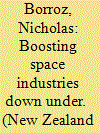

|
|
|
|
|
| Summary/Abstract |
Both New Zealand and Australia have flourishing space industries and in both government intervention is important in their development. Although the two countries have similar political economies, they intervene in different fashion. In New Zealand the focus is more on facilitating the activity of market actors, but in Australia there is more emphasis on guiding space development. Whereas New Zealand, for instance, seeks to reduce regulatory burdens, Australia focuses on financing business segments in the industry that it wants to grow. That business-government relations in the two countries differ may be one explanation for this contrasting approach.
|
|
|
|
|
|
|
|
|
|
|
|
|
|
|
|
| 3 |
ID:
182270


|
|
|
|
|
| Summary/Abstract |
America's withdrawal from Afghanistan has been compared to its withdrawal from South Vietnam, and cited as two examples among many of US blunders, set-backs and losses of allies and influence since the Second World War. But there is compelling counter-evidence showing numerous US contributions to global stability and justice. The United States is still the least bad choice as a leader of liberal states to resist the current surge of authoritarianism fostered by China and Russia and illiberal political leaders and parties. It needs to stand firm on democratic values internationally by embedding the erstwhile American Century in a Liberal Century.
|
|
|
|
|
|
|
|
|
|
|
|
|
|
|
|
| 4 |
ID:
180413
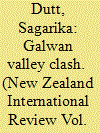

|
|
|
|
|
| Summary/Abstract |
On 15 June 2020 Indian and Chinese troops clashed in the Galwan valley along the line of actual control (LAC) in eastern Ladakh. It claimed the lives of twenty Indian army personnel, according to Indian government sources. A number of Chinese soldiers were also killed in this conflict. It was the culmination of a border stand-off that began in May. This is not the first time that there have been serious tensions in the border areas. The last time there was a military standoff between the two armies was in 2017 in Doklam. But this time it was even more serious and the Indian prime minister, Narendra Modi, has taken it to heart. He feels that it was a betrayal by the Chinese government after he had extended a hand of friendship and goodwill to them and signed business deals with them. It reminds one of how Jawaharlal Nehru felt when the 1962 war between India and China took place. In a televised message to the Indian nation, Modi said that the martyrdom of the twenty soldiers will not be in vain and that India's territorial integrity and sovereignty is supreme. India will do whatever it takes to defend the country and its borders. This article reflects on and analyses India's response to the border clash and the efforts that have been made by India and China to de-escalate tensions in the border areas.
|
|
|
|
|
|
|
|
|
|
|
|
|
|
|
|
| 5 |
ID:
180412
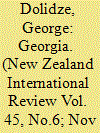

|
|
|
|
|
| Summary/Abstract |
It is my privilege to address distinguished subscribers of the NZIR as an ambassador extraordinary and plenipotentiary of Georgia to New Zealand. It is with pride that I would like to introduce some aspects related to my country to the interested people in New Zealand or elsewhere.
|
|
|
|
|
|
|
|
|
|
|
|
|
|
|
|
| 6 |
ID:
180417
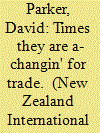

|
|
|
|
|
| Summary/Abstract |
In this article I will address the 'state of the world' in international trade, the concerning trend towards protectionism and three major challenges I see ahead of us - the environment and trade, digital trade and the challenges assailing international institutions. I will then outline New Zealand's response to all of this including our immediate response to the Covid-19 crisis, our trade recovery strategy and finally Trade for All.
|
|
|
|
|
|
|
|
|
|
|
|
|
|
|
|
| 7 |
ID:
180414
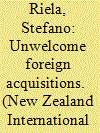

|
|
|
|
|
| Summary/Abstract |
Robotics, artificial intelligence, big data and 5G. These are the keywords used to justify the wave of protectionism against foreign acquisitions adopted by many advanced economies after 2016. In that year, China reached the record of acquisitions abroad, a shopping that mainly targeted American and European firms active in the sectors indicated by the national strategic plan 'Made in China 2025'. A decade before China, the finger pointed at the sovereign wealth funds whose acquisitions - especially of infrastructure - were triggered by the boom of commodity prices pulled by oil.
|
|
|
|
|
|
|
|
|
|
|
|
|
|
|
|
| 8 |
ID:
180416
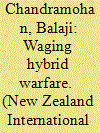

|
|
|
|
|
| Summary/Abstract |
Hybrid warfare is an emerging, though as yet ill-defined, notion in the discipline of war and conflict studies. It underlines the realism principle in international relations, where the use of force is considered a normal option for a state seeking to achieve its political objectives. In other words, hybrid warfare refers to the use of unconventional methods as part of a multi-domain war fighting environment. The unconventional approach is deeply embedded overall in military thinking. Hybrid warfare methods aim to disrupt and disable an opponent's actions without engaging in open hostilities - the opposite of the traditional linear integral battle of annihilation followed by modern militaries. The main focus of hybrid warfare is on disruption rather than destruction.
|
|
|
|
|
|
|
|
|
|
|
|
|
|
|
|